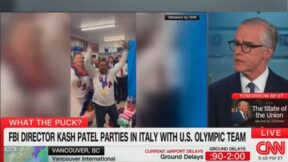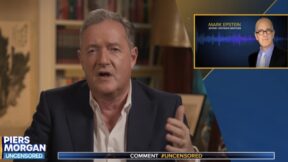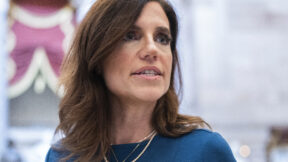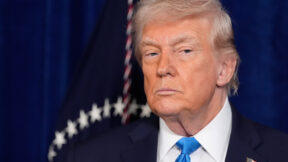Elon Musk Walks Back Making Twitter an Absolute Free Speech Zone: ‘Cannot Become a Free-For-All Hellscape’

CARINA JOHANSEN/NTB/AFP via Getty Images
Elon Musk, the richest man in the world, wrote a short announcement on Twitter Thursday captioned, “Dear Twitter Advertisers,” and declared that under his watch content moderation would continue in an apparent effort to keep companies advertising on the platform.
The short announcement was shared in two screenshots and appeared to walk back the idea that Musk would reform Twitter to be an absolute free speech zone.
Musk’s bid to buy Twitter in early April for $43 billion has led to a months-long saga of back-and-forth negotiations as the eccentric billionaire has tried to pull out of the debt-riddled deal and been pulled back in by an ongoing court battle. Musk is up against a court-ordered 5 p.m. Friday deadline to close the original deal or face a November trial.
Now, as Musk’s takeover of the social media platform appears imminent, he is working to maintain the company’s revenue stream.
“I wanted to reach out personally to share my motivation in acquiring Twitter. There has been much speculation about why I bought Twitter and what I think about advertising. Most of it has been wrong,” he wrote on Twitter, adding:
The reason I acquired Twitter is because it is important to the future of civilization to have a common digital town square, where a wide range of beliefs can be debated in a healthy manner, without resorting to violence. There is currently great danger that social media will splinter into far right wing and far left wing echo chambers that generate more hate and divide our society.
In the relentless pursuit of clicks, much of traditional media has fueled and catered to those polarized extremes, as they believe that is what brings in the money, but, in doing so, the opportunity for dialogue is lost.
Axios added some additional context for Musk’s comments, noting, “Musk’s note to advertisers came shortly after the Wall Street Journal reported that marketers are concerned about Musk’s stance on content moderation and potential conflicts over ads.”
“Ad sales accounted for more than 90% of Twitter‘s revenue in the second quarter, and Reuters reported earlier this week that the company was struggling to keep its most active users who are vital to the business,” noted Reuters of Twitter’s financial situation.
“That is why I bought Twitter. I didn’t do it because it would be easy. I didn’t do it to make more money. I did it to try to help humanity, whom I love. And I do so with humility, recognizing that failure in pursuing this goal, despite our best efforts, is a very real possibility,” added Musk in his statement. Musk and his investors are widely expected to burn a great deal of money on financing the purchase of the social media company.
“That said, Twitter obviously cannot become a free-for-all hellscape, where anything can be said with no consequences!” Musk added, making clear some kind of content moderation will continue.
“In addition to adhering to the laws of the land, our platform must be warm and welcoming to all, where you can choose your desired experience according to your preferences, just as you can choose, for example, to see movies or play video games ranging from all ages to mature,” he concluded.
Since making his offer to buy Twitter, Musk has laid out his definition of free speech in vague terms.
In late April, Musk addressed the backlash to his takeover bid and subsequent tweets bashing the left. “The extreme antibody reaction from those who fear free speech says it all,” he wrote on Twitter, adding:
By “free speech”, I simply mean that which matches the law.
I am against censorship that goes far beyond the law.
If people want less free speech, they will ask government to pass laws to that effect.
Therefore, going beyond the law is contrary to the will of the people.
At the TED2022 conference in April, Musk added to his definition, saying, “Is someone you don’t like allowed to say something you don’t like? If that is the case, then we have free speech. It’s damn annoying, but that is the sign of a healthy, functioning free speech situation.”
He also addressed content moderation, saying, “If it’s a gray area, I would say let the tweet exist. In a case where there’s perhaps a lot of controversy, you don’t necessarily promote that tweet. I’m not saying I have all the answers here, but I do think we want to be very reluctant to delete things, and just be very cautious with permanent bans — timeouts, I think, are better.”
New: The Mediaite One-Sheet "Newsletter of Newsletters"
Your daily summary and analysis of what the many, many media newsletters are saying and reporting. Subscribe now!






Comments
↓ Scroll down for comments ↓